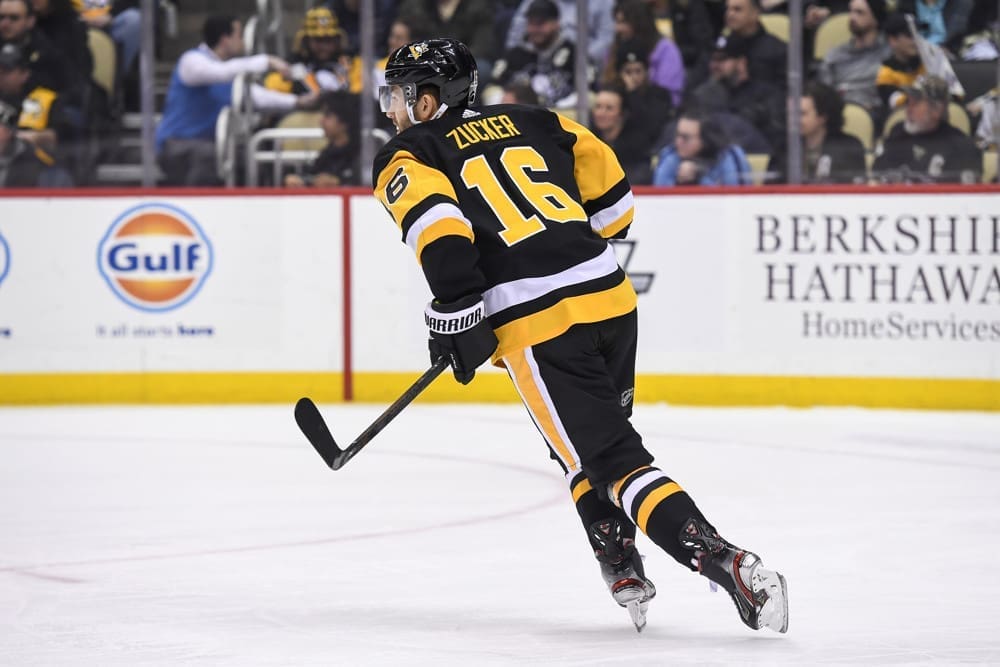Penguins
‘Less Robotic’ Jason Zucker Could Fill the Net for Penguins; They Need It

There is no secret how Jake Guentzel and Sidney Crosby will perform together. In an offseason of upheaval and attempted upheaval, the Guentzel-Crosby pairing is the bedrock duo on which the Pittsburgh Penguins lineup is built. The other half of the two-headed Penguins center monster is Evgeni Malkin but the Penguins’ second line with Bryan Rust and Jason Zucker is not yet the pillar the Penguins foresee.
Make no mistake, Jim Rutherford circled Jason Zucker and kept after the Minnesota Wild until a Penguins trade was finally possible. The first attempt to acquire Zucker ended when Phil Kessel exercised his veto power and nixed a trade to Minnesota. By February 2020, Rutherford dished a top prospect, a top pick, and got to dump a little salary for Zucker.
Zucker was the guy Rutherford felt could help return the Penguins to the speed game, which catapulted them to historic back-to-back Stanley Cup wins. The Penguins have a lot riding on the Zucker-Malkin-Bryan Rust line.
“Geno is a world-class talent as far as passing and the overall game. For me, I can keep my game simple, like I want to play,” Zucker said on Wednesday. “I’m not a fancy east-west guy.”
Zucker is still adjusting to life as a Penguin. It seems like a lifetime because of the pandemic pause. Zucker was acquired 11 months ago but has played just 19 total games for the Penguins, including four NHL postseason games. His stats perhaps surpassed his impact when playing with Malkin.
In those 19 games, Zucker has eight goals and six assists but had just one goal in 60 even-strength minutes with Malkin.
Thus far in training camp, Zucker, Malkin, and Rust have toyed with their competition. It’s been such a discrepancy in talent the line has appeared to be at half-speed as Rust and Zucker finish wide-open chances and breakaways.
“Rusty is very similar to me in the sense that he wants to play a gritty north-south game, as well. If we can use our speed wide, try to push (defensemen) back, we can get to a lot of open space to make some plays,” Zucker said. “At that point, we’re giving (Malkin) a lot of open space to make some plays.”
And guess who will be finishing those plays? The Pittsburgh Penguins hope Zucker and Rust, who had a career-high 27 goals last season.
Zucker has popped for big totals before, but he’s also slumped and struggled. In 2017-18, he exploded for 33 goals and 31 assists in 82 games. However, he’s scored only 41 goals over two seasons since that outburst and totaled only 83 points.
Part of that was also the decline in Minnesota, where former Wild head coach Bruce Boudreau shuffled Zucker around the lineup. Boudreau’s system is also much different and doesn’t promote speed in the same ways as the Penguins’ system.
“I feel that (the Penguins system) is a very up-tempo system, trying to read plays a little bit more and not be very robotic with a lot of things,” Zucker said. “A lot of it is based on reading plays, just playing hockey and then playing fast…
…When I’m playing my best hockey, I’m using my speed to my advantage…”
That speed theme will be evident throughout the Penguins lineup. Eventually, the Penguins expect Kasperi Kapanen to get through immigration in Finland to join the team. The top two lines will be lightning fast with some grit. Jared McCann will add ample “fast” to the third line. Teddy Blueger and Brandon Tanev also play at top speed.
Rutherford’s goal was to be a fast team again, and that part has been accomplished. If Zucker can fill the net as Rutherford hopes, the Penguins may have one of the NHL’s best top-six groups.
That’s the hope, and even under trying circumstances and a crazy world, training camp hope springs eternal. Zucker could fill the net for the Pittsburgh Penguins. In a stacked East Division and with a questionable bottom six, they’re going to need every goal.












